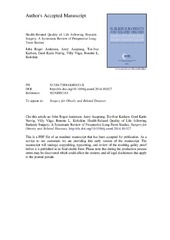| dc.contributor.author | Andersen, John Roger | en_US |
| dc.contributor.author | Aasprang, Anny | en_US |
| dc.contributor.author | Karlsen, Tor-Ivar | en_US |
| dc.contributor.author | Natvig, Gerd Karin | en_US |
| dc.contributor.author | Våge, Villy | en_US |
| dc.contributor.author | Kolotkin, Ronette Loganzo | en_US |
| dc.date.accessioned | 2016-08-09T09:10:37Z | |
| dc.date.available | 2016-08-09T09:10:37Z | |
| dc.date.issued | 2015-03 | |
| dc.Published | Surgery for Obesity and Related Diseases 2015, 11(2):466-473 | eng |
| dc.identifier.issn | 1550-7289 | |
| dc.identifier.uri | https://hdl.handle.net/1956/12507 | |
| dc.description.abstract | Impaired health-related quality of life (HRQoL) is common in bariatric surgery candidates and is often one of the motivating factors for seeking bariatric surgery. Although many studies have reported changes in HRQoL after bariatric surgery, few are long-term prospective studies and no systematic review has been conducted. A systematic database search identified studies reporting HRQoL preoperatively and≥5 years after bariatric surgery. Change in HRQoL over time was the outcome variable, divided into primary and secondary outcomes. Seven prospective cohort studies met the inclusion criteria. Eight HRQoL measures and 6 surgical methods were identified. Long-term follow-up time ranged from 5–10 years, sample sizes from 44 to 655 patients, and follow-up rates from 61% to 92%. None of the 7 studies were randomized controlled trials, and only 2 studies used control groups. Six of 7 studies showed statistically significant improvements in all of the primary outcomes, and 1 study showed statistically significant improvements in 1 of 2 primary outcomes. Of the statistically significant HRQoL improvements, 92% were clinically meaningful. Peak improvements in primary HRQoL outcomes were typically observed during the first years of follow-up, followed by a gradual decline that seemed to stabilize 5 years postoperatively. Long-term HRQoL scores typically remained improved relative to preoperative scores but were somewhat below population norm scores. In conclusion, while bariatric surgery candidates reported impaired HRQoL presurgically, their HRQoL improved considerably after bariatric surgery and much of the initial HRQoL improvements were maintained over the long term. | en_US |
| dc.language.iso | eng | eng |
| dc.publisher | Elsevier | eng |
| dc.rights | Attribution CC BY-NC-ND | eng |
| dc.rights.uri | http://creativecommons.org/licenses/by-nc-nd/4.0/ | eng |
| dc.subject | Health-related quality of life | eng |
| dc.subject | Quality of life | eng |
| dc.subject | Bariatric surgery | eng |
| dc.subject | Obesity | eng |
| dc.subject | Systematic review | eng |
| dc.title | Health-Related Quality of Life following Bariatric Surgery: A Systematic Review of Prospective Long- Term Studies | en_US |
| dc.type | Peer reviewed | |
| dc.type | Journal article | |
| dc.date.updated | 2015-02-16T07:30:42Z | en_US |
| dc.description.version | acceptedVersion | en_US |
| dc.rights.holder | Copyright 2015 American Society for Bariatric Surgery | |
| dc.identifier.doi | https://doi.org/10.1016/j.soard.2014.10.027 | |
| dc.identifier.cristin | 1179018 | |

